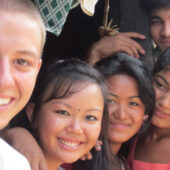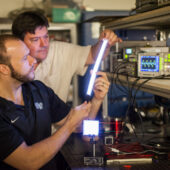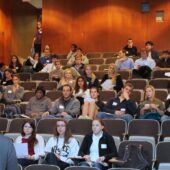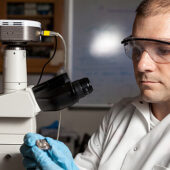2012 Highlights: Mentoring
 It could be the motto that we hold so dear: Pro Humanitate. Or the enviably low student-teacher ratio of 11 to 1. Or the teacher-scholar tradition that our faculty embraces. Whatever the reason, mentoring at Wake Forest goes to a whole new level. Read some of the best stories from 2012.
It could be the motto that we hold so dear: Pro Humanitate. Or the enviably low student-teacher ratio of 11 to 1. Or the teacher-scholar tradition that our faculty embraces. Whatever the reason, mentoring at Wake Forest goes to a whole new level. Read some of the best stories from 2012.
 Using an online computer game that simulates the spread of an infectious disease among its players, researchers learned more about what motivates people to protect themselves from infection.
Using an online computer game that simulates the spread of an infectious disease among its players, researchers learned more about what motivates people to protect themselves from infection. Humanistic inquiry is at the heart of Wake Forest's liberal arts tradition. Together, faculty and students bring to life scholarly and undergraduate research, campus and community programming, and interdisciplinary activities that connect the humanities with science, social science and artistic fields. Here are some of last year's highlights.
Humanistic inquiry is at the heart of Wake Forest's liberal arts tradition. Together, faculty and students bring to life scholarly and undergraduate research, campus and community programming, and interdisciplinary activities that connect the humanities with science, social science and artistic fields. Here are some of last year's highlights. To better understand virtue and vice and how to define good character, The Character Project at Wake Forest has granted nearly $1 million in research funding to theologians and philosophers from around the world.
To better understand virtue and vice and how to define good character, The Character Project at Wake Forest has granted nearly $1 million in research funding to theologians and philosophers from around the world. That Steve Folmar's research in Nepal has been funded by the National Science Foundation’s cultural anthropology program is reason to celebrate. For students, however, the best news is that the support brings additional opportunities to be a part of the project.
That Steve Folmar's research in Nepal has been funded by the National Science Foundation’s cultural anthropology program is reason to celebrate. For students, however, the best news is that the support brings additional opportunities to be a part of the project. Say goodbye to that annoying buzz created by overhead fluorescent light bulbs in your office or residence hall. Wake Forest scientists have used nanotechnology to develop a flicker-free, shatterproof alternative for large-scale lighting.
Say goodbye to that annoying buzz created by overhead fluorescent light bulbs in your office or residence hall. Wake Forest scientists have used nanotechnology to develop a flicker-free, shatterproof alternative for large-scale lighting. Communication professor Alessandra Von Burg’s vision was born of the idea that everyone has stories to tell whether they are lifelong U.S. citizens or recent immigrants.
Communication professor Alessandra Von Burg’s vision was born of the idea that everyone has stories to tell whether they are lifelong U.S. citizens or recent immigrants.  Students in Pat Lord's Bio 367 Virology class helped create a new program designed to develop students' critical thinking skills about bioethics outside the classroom. And it all started with dinner ... and a movie.
Students in Pat Lord's Bio 367 Virology class helped create a new program designed to develop students' critical thinking skills about bioethics outside the classroom. And it all started with dinner ... and a movie. Wake Forest researchers received a $700,000 grant from the National Institutes of Health to bring to market a new drug-discovery tool using next-generation genetic sequencing. Someday, pharmaceutical companies will use their technology as a sort of Google search for new drugs, making diagnostics discovery significantly more efficient.
Wake Forest researchers received a $700,000 grant from the National Institutes of Health to bring to market a new drug-discovery tool using next-generation genetic sequencing. Someday, pharmaceutical companies will use their technology as a sort of Google search for new drugs, making diagnostics discovery significantly more efficient.
 The economy is frightening enough, but its uncertainty might be fueling the fascination Americans have with the undead in popular TV shows, movies and certainly ... Halloween.
The economy is frightening enough, but its uncertainty might be fueling the fascination Americans have with the undead in popular TV shows, movies and certainly ... Halloween.